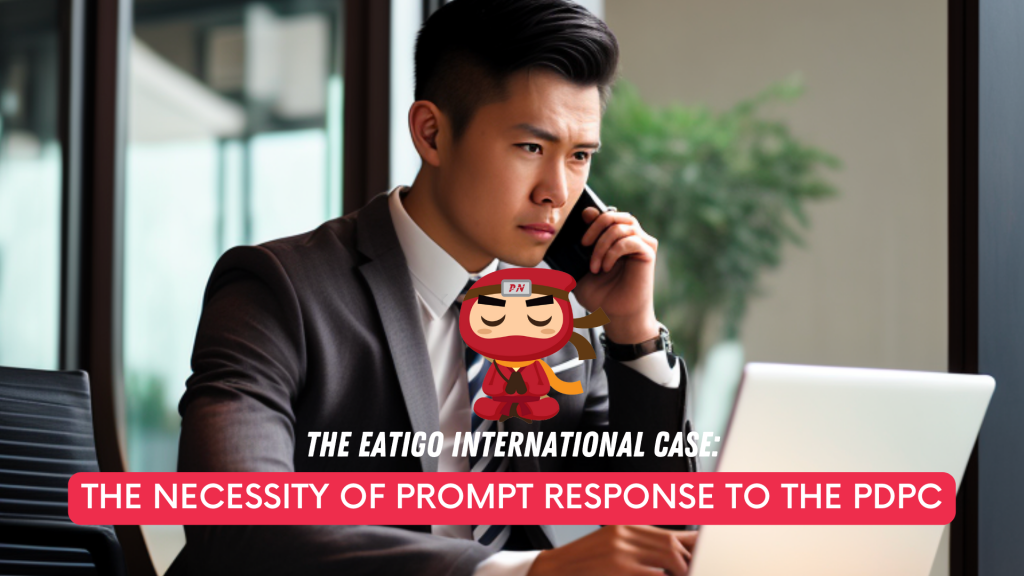
In today’s digital age, data breaches have become a frequent occurrence for organisations of all sizes and industries. When a data breach occurs, it is essential for an organisation to respond quickly to mitigate the damage and protect its customers’ personal data.
The Personal Data Protection Commission (PDPC) is responsible for enforcing Singapore’s personal data protection laws and regulations. Therefore, when a data breach occurs, it is necessary for an organisation to respond quickly to the PDPC or accept its liability; it serves as a mitigating circumstance that could potentially convert an impending financial penalty to a mere warning.
Responding quickly to the PDPC shows that an organisation is committed to complying with Singapore’s personal data protection laws and regulations. It demonstrates that the organisation has taken the necessary steps to ensure that the breach is contained and that affected individuals are notified promptly. By accepting liability, the organisation takes responsibility for the breach and shows its commitment to resolving the issue quickly and effectively.
In a long list of PDPC cases, promptness in responding to the PDPC is considered a mitigating circumstance that could lessen or even cancel out the penalty imposed. On the other hand, when an organisation does not respond quickly, this will be taken as an aggravating circumstance that could increase the financial penalty. This is because not responding quickly would mean more time that the personal data is being at risk while investigations are ongoing. This happened in the case of Eatigo International.
According to PDPC, Eatigo International caused delays with investigations due to its dilatory responses. It impeded the commission’s investigations with its uncooperative and evasive responses to the commission when it objected to the PDPC’s request for information about the access models implemented for current production databases, giving the excuse that it might create “additional security risks”; and objecting to providing information regarding access to the exfiltrated Affected Database, citing the reason that this was against their policy and might create “additional security risks”.
With these uncooperative and evasive responses, Eatigo International was fined a hefty financial penalty of S$62,400. Such a large sum was due to the fact that these responses served as an aggravating circumstance surrounding the case.
What we can get from this case is the necessity of having prompt responses whenever a data breach occurs, as this has a big impact on the verdict of the PDPC. If done right, the PDPC may take this as a mitigating circumstance that could lead to a warning instead of a financial penalty.
Your appointed DPO can work with you on your PDPA compliance, ensuring that there will be policies in place to make sure that the handling of personal data is PDPA compliant. This includes promptly responding to the PDPC with their queries to expedite the investigations and prevent a harsher penalty from the Commission.
A Data Protection Officer (DPO) oversees data protection responsibilities and ensures that organisations comply with the Personal Data Protection Act (PDPA). Furthermore, every Organization’s DPO should be able to curb any instances of PDPA noncompliance as it is the officer responsible for maintaining the positive posture of an organisation’s cybersecurity.
DPOs complement organisations’ efforts to ensure that the organisation’s methods of collecting personal data comply with the PDPA. It also ensures that policies are set in place to make sure that there will be no instances of data breaches in the future.
Don’t wait any longer to ensure your organisation is PDPA compliant. Take our free
3-minute PDPA Compliance Self-audit checklist now, the same “secret weapon” used by our clients to keep them on track. Upon completion, we will send you the results so you can take the necessary action to protect your customers’ data. Complete the free assessment checklist today and take the first step towards protecting your customers’ personal data.
Importance of Efficient Access Controls that every Organisation in Singapore should take note of. Enhancing…
Prioritizing Security Measures When Launching a Webpage That Every Organisation in Singapore should take note…
Importance of Regularly Changing Passwords for Enhance Online Security that every Organisation in Singapore should…
Comprehensive Approach to Data Protection and Operational Integrity that every Organsiation in Singapore should know…
Here's the importance of Pre-Launch Testing in IT Systems Implementation for Organisations in Singapore. The…
Understanding Liability in IT Vendor Relationships that every Organisation in Singapore should look at. Understanding…
This website uses cookies.